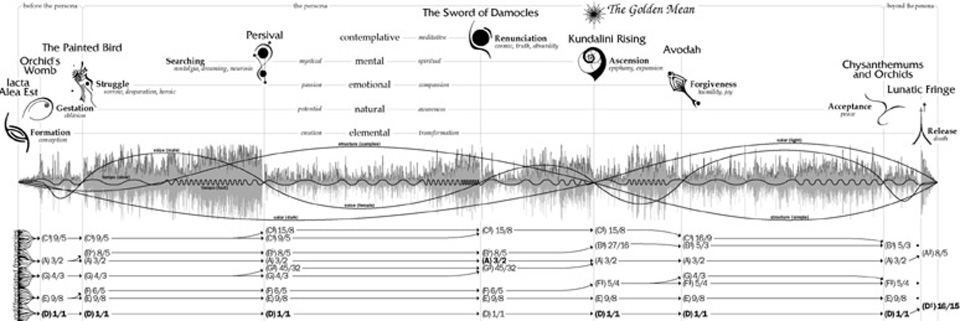
Mark confidently combines traditional structures of Western classical music with the contemplative precision, melodic mantras and tonal characteristics of Indian traditional music, and the vibrant openness of jazz improvisation. Like the late bass virtuoso, Jaco Pastorious, Mark Deutsch is a bassist who can carry not only the rhythm, but the harmony and melody as well … His playing is wrenchingly emotional and evocative, conveying pathos, fervor, and undying conviction … (Mark) has produced an album which is a totally involving experience. It is an expression of the depth and beauty of life, where each track has a sense of dignity and tenderness that is genuinely touching. An album to listen to with your ears connected to your heart.”
Ben Kettlewell
Editor, Alternate Music Press
Mark Deutsch’s Fool… is a complex composition of solo works for sitar and bazantar, an instrument of Deutsch’s own invention which modifies a five-string acoustic bass with four additional drone strings and 29 sympathetic strings. The development and schematic outline of the piece are explained in detail in Deutsch’s liner notes, accompanying diagrams and grids, and its fundamental concept is described as being that “of respiration, which manifests as the interplay between pairs of opposites”. The composition adopts an arch structure, with the third movement, inspired by the legend of The Sword of Damocles, acting as the kernel and principal source of harmonic and thematic derivation.
Deutsch’s diverse musical background is reflected in the wide range of Western and Eastern idioms tapped in this work. The introductory Iacta Alea Est uses Tibetan balls and Chinese gongs to great effect, while the final Lunatic Fringe is scored for chimes, glockenspiel and triangle. Deutsch’s impressive artistry on sitar is demonstrated in Orchid’s Womb, the peaceful Chrysanthemums and Orchids and especially in the tripartite Persival. His exploitation of the bazantar is especially innovative, treading the line between refreshing and bizarre. The instrument’s remarkable tonal range is skilfully displayed throughout – whether in The Painted Bird, The Sword of Damocles or the ethereal Lux aeterna and exultant Allegro of Kundalini Rising – but it is especially demonstrated in the two contrasting sections of Avodah. A revolutionary disc and a must for experimentalists.
Robin Stowell
Double Bassist Number 11, pg. 62
The extraordinary resonant sound of the Bazantar, whether bowed or plucked, is different from anything else you have heard. Whether the bass half of this symbiotic creature is growling in the contraoctave, or singing two to three octaves higher up, there is an unsurpassed richness in sound. This is due to the ringing of the sympathetic strings but also to the tuning of the bass itself and indeed the construction of the entire instrument, which its inventor describes as energy conserving and tension-minimizing. Another part of the secret is that Mark plays not in tempered tuning, but drawing from a number – in fact, no less than 66 – of other harmonically resonant divisions of the octave, which are tabulated in the accompanying booklet.
The booklet also contains Mark’s composer’s notes to help the listener comprehend the structure of “Fool…”. A 3-page fold-out, graphic display representing the piece illustrates the evolution of “a being that is wise enough to be a fool – a fool for something, be it art, music, science, or love,” from its conception to its death or transformation. Space does not permit me to go into detail here, but the various movements, alternately played on the sitar and Bazantar, are associated with characters, emotions or concepts such as contemplation, meditation, renunciation, the cosmos, truth and absurdity. Some of these particular predicates apply to “The Sword of Damocles,” the work’s central movement. I highly recommend this recording, both for the opportunity to experience this new instrument, as well for its musical content. The music is clearly India-inspired, but through the Bazantar it becomes something unique, promoting a wonderful sense of relaxation and mental peace.
Ture Damhus
Bass World, Vol. 23, No.2, pp 78-81